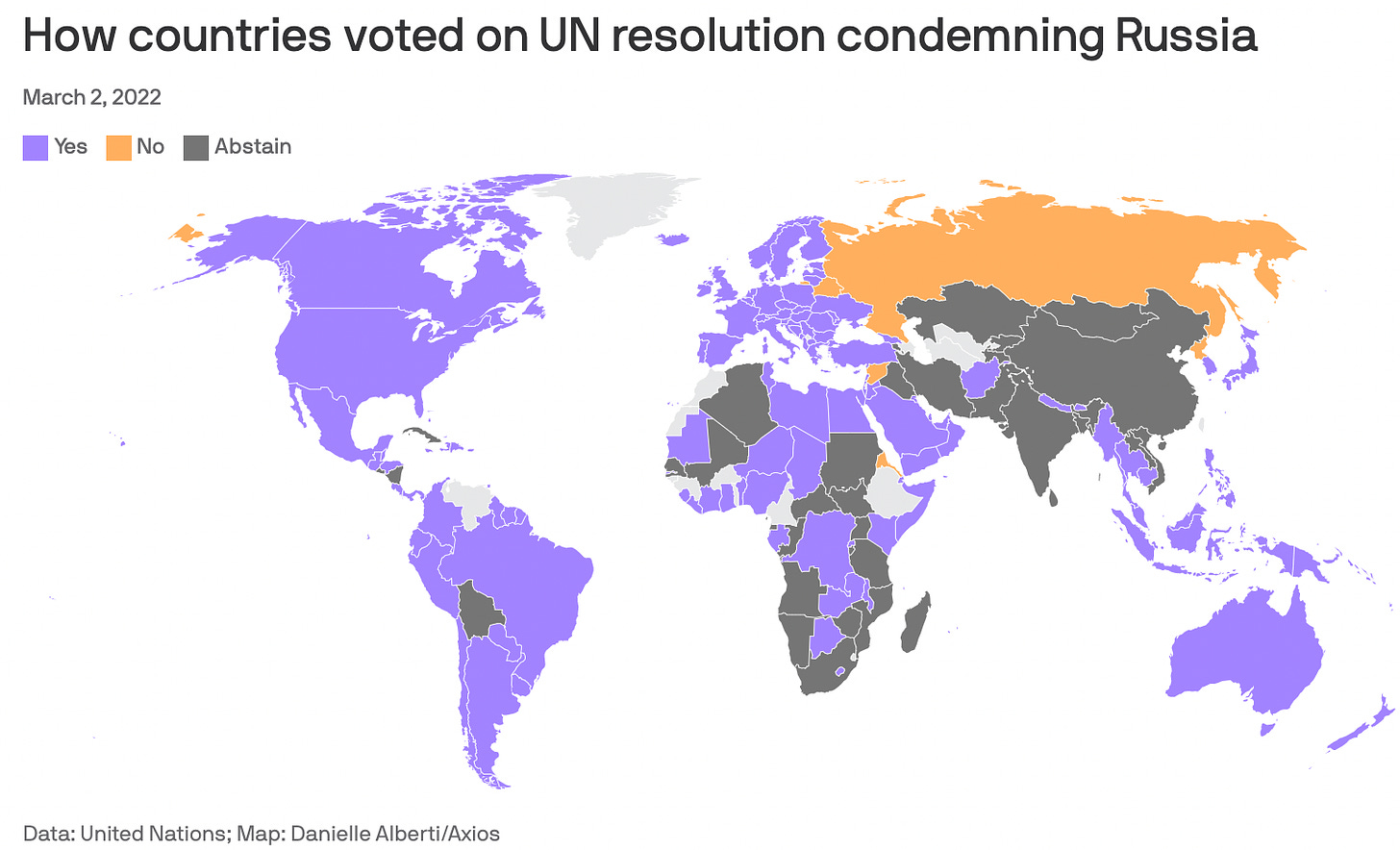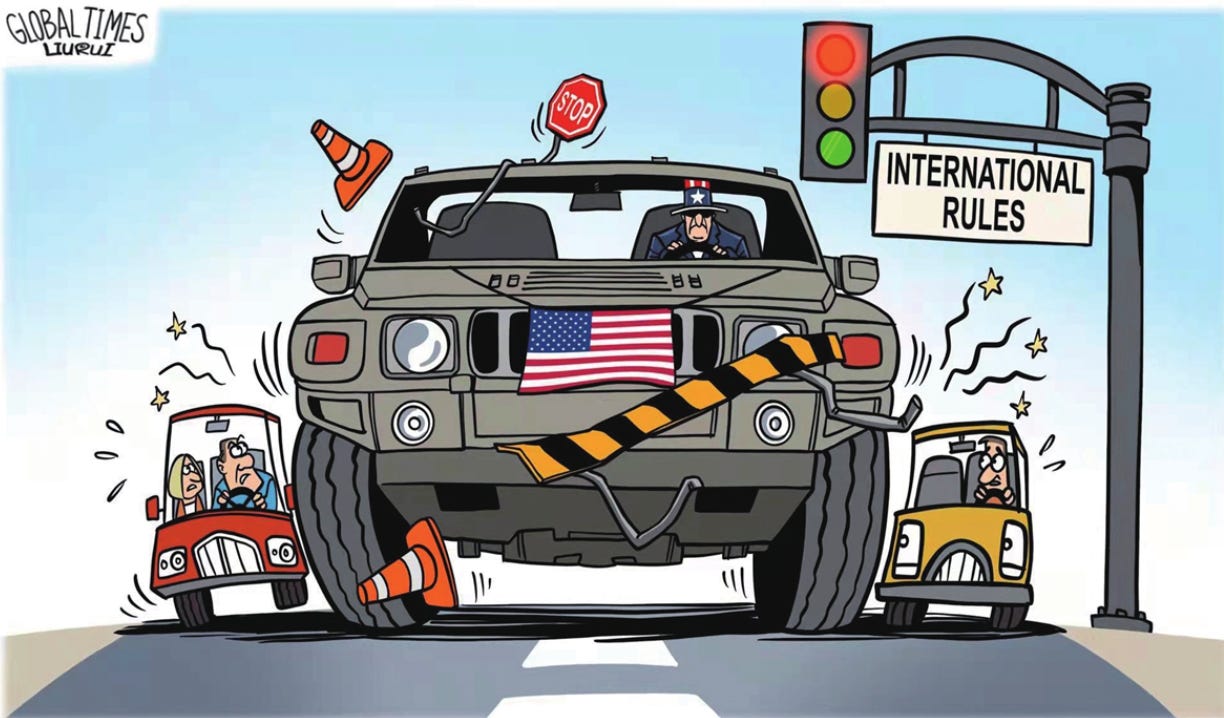Russia’s war against Ukraine has divided the world geopolitically into three main blocs: pro-Ukraine, pro-Russia, and fence-sitters. The United Nations General Assembly resolution — condemning Vladimir Putin’s murderous invasion and demanding immediate withdrawal of troops — has redrawn the geopolitical map. Europeans voted to condemn the war in their midst. But even though Vladimir Putin’s invasion of Ukraine is nothing more than the brutal recapture of a colony, many of the governments of Europe’s former colonies abstained from condemnation. Of 193 members of the UN’s General Assembly, 141 voted to condemn Russia, 5 voted against, and 35 abstained.
Europe, virtually all of the Western Hemisphere, Japan, South Korea, Australia, most of southeast Asia, and half of Africa voted to condemn Russia’s invasion. This included Hungary and Serbia which are two European countries with the closest ties to Moscow. However, most of the leaders whose countries voted for an immediate Russian withdrawal have not publicly called out Putin or Russia since. And more worrisome is that the support among non-Western countries against Russia “was quite thin” commented an expert.
The four nations that sided with Russia were Belarus, Eritrea, North Korea, and Syria. The 35 abstainers were led by gigantic China and India and Pakistan; 17 African countries including South Africa; two Middle Eastern countries Iran and Iraq; former Russian vassals Armenia and Mongolia, and a scattering of others from Latin America, Central Asia, and Southeast Asia.
But six countries that had supported Russia in 2014, by refusing to condemn its annexation of Crimea in Ukraine, abstained this time: Armenia, Bolivia, Cuba, Nicaragua, Sudan, and Zimbabwe. Venezuela did not vote because it has been suspended for not paying UN dues.
The splintered outcome is shocking, given Russia’s flagrant disregard for human life or international norms. It also belies President Joe Biden’s boast that diplomatic and sanctions efforts have "isolated Russia from the world”. Many countries have also refused to impose severe financial and energy sanctions like those in America and Europe. This means that reaching any kind of consensus in the future will be like herding cats, unlike the bad old Cold War days when the world was divided into “two teams”.
Such geopolitical fragmentation accelerated in 2002 when the United States invaded Iraq after failing to get authorization at the UN due to objections by France and Russia. That’s when Washington bypassed global norms and created its “coalition of the willing” to invade Iraq, creating chaos across the Middle East, the destruction of Syria, and the permanent displacement of tens of millions of people. Then in 2013, the US again failed to gain Security Council approval for military intervention in Syria and created another ad hoc coalition to try and clean up that mess.
Ambivalence toward American policy by some, leavened with self-interest, is behind those countries that disapprove of Russia’s behavior but play “geopolitics” in order to feed their populations or play one superpower off against another to net energy, weaponry, or geopolitical favors. This is India’s game, but its fence-sitting vis-a-vis Russia dates back to the Cold War’s proxy wars. For decades, India has had a special relationship with Russia to protect itself against the special relationship between China and Pakistan. But India’s skirmishes and military skirmishes with China have also led it to join The Quad, a regional and quasi-military intelligence organization, founded by Japan, Australia, and the United States.
India juggles these allegiances with alacrity and its Prime Minister Narendra Modi has recently received high-level visits, with promises of more aid and trade, from the United States, Japan, Australia, the European Union, China, and Russia. Modi noted, in a recent speech, that regional cooperation has become a larger priority than international cooperation because the continuing Russia-Ukraine issue has “raised worries about the stability of the world order.” Russia is a major supplier of energy, weapons, and wheat to India and others.
Similarly, China attempts the same juggling act, faced as it is with resentment from its biggest trading partner, the United States, over its special relationship with Russia, its major supplier of commodities. China trades with everyone, a great deal, and its Belt and Road Initiative has spent $1 trillion building infrastructure — and political support — in dozens of geopolitically strategic poor nations.
What’s disappointing, however, are the juggling acts undertaken by fellow NATO member Turkey as well as American ally Israel. “We can neither give up on Ukraine nor on Russia,” declared Turkish President Recep Tayyip Erdogan. Turkey buys weapons from Russia and sells weapons to Ukraine. Turkey’s press parrots Kremlin disinformation — that Ukraine is a den of neo-Nazis — and resentfully points out that Europe’s warm welcome for Ukrainian refugees is in contrast to its rejection of most of the millions of Muslims who had to flee Syria and Afghanistan. Turkish attitudes are understandable, given that millions of Syrian and Afghan refugees displaced by American and Russian interventions now live in Turkey. Nearly 11.1 million Syrians still need humanitarian assistance.
Then there’s Israel, with a similarly nuanced approach toward Russia’s catastrophic behavior. It voted to condemn its invasion but is “walking between the raindrops” -- an Israeli expression referring to an attempt not to get wet. Culturally, Israel is home to one million Russian immigrants but Ukraine’s President is Jewish, along with hundreds of thousands of Ukrainians. Israel condemned the invasion but has only sent humanitarian, not military, assistance to Ukraine. This is because Israel needs Russian permission to carry out airstrikes against Iranian targets in Russian-held parts of Syria.
Israel’s double-dealing has upset some American legislators who cite the fact that Israel gets $3.8 billion a year in American military assistance and should give the U.S. and Europe full-throated support against Moscow’s savagery. “They ought to be stepping up like the rest of the world. I don’t understand it,” said Senator Angus King recently. “I understand it’s because they feel they have some red light, green light from Russia about attacks on Iranian assets in the Middle East … but that’s, it’s very disappointing, especially considering the massive amount of military aid we’ve provided to them.”
Others, like capitalistic Singapore, meticulously avoid taking sides. The city-state is worried that the current situation will worsen the clash between the U.S. and China, thus affecting the security and economic situation in Southeast Asia. Likewise, Brazil, headed by Jair Bolsonaro a far-right populist leader, voted to condemn the invasion, but has declared he’s in “solidarity with Russia”. His foreign minister elaborated: “Brazil's position is clear... We are on the side of world peace. We think we can reach that [peace]... by helping to find a way out [of the war], not by taking sides." Russian fertilizers are crucial for Brazil's giant agribusiness sector and Russia’s “friend”, China, is one of the country’s biggest trade partners.
South Africa also abstained in the UN vote, but its President Cyril Ramaphosa has blamed NATO for the war in Ukraine and said he would resist calls to condemn Russia. “The war could have been avoided if NATO had heeded the warnings from amongst its own leaders and officials over the years that its eastward expansion would lead to greater, not less, instability in the region," said Ramaphosa.
As one expert points out the concept of world order is a myth, wrote Jakub Grygiel, a professor at the Catholic University of America in the Wall Street Journal. “An Earth-spanning security space governed by global rules or a few key powers doesn’t exist, as the war in Ukraine should remind us. There is also no `global threat’ facing all states equally but, rather, regional revisionist powers threatening nearby states. Temporary regional equilibria with their own power dynamics are driven by local historical competitions. They are unstable and prone to wars. They require persistent attention and management.”
Put another way: not only are all politics local. But so, apparently, are all geopolitics.
NOTE: Hit the Share button to send this to social media, but those who wish to email this newsletter to others can do so by forwarding it to another email or, if that doesn’t work, by copying it and pasting it onto another email then sending it in order to avoid the paywall.







You have opened a new level of awareness as regards global awareness / alliances. I didn't know Turkey is housing 11 million refugees either.
We think about a Russian attack but they are under more threat than Ukraine on their western flank who could shut down Crimea. This would force another relocation of their forces, including their entire Black Sea fleet.
Thnx for another most informative article. Yes, local Politics and Geopolitics, but clearly geography too. Whatever the outcome, the world of consumers will have to deal with higher prices for almost everything....that is unless we big consumers change our 'must have' list of products.